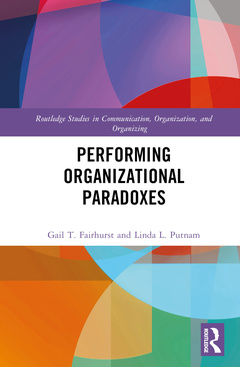Performing Organizational Paradoxes Routledge Studies in Communication, Organization, and Organizing Series
Auteurs : Fairhurst Gail T., Putnam Linda L.

Performing Organizational Paradoxes takes a constitutive, process approach to organizational paradoxes. It underscores the performative nature of paradox through underlying dialectical tensions, its sociomaterial foundations, and power features that bring paradoxes to life, sustain them, and enable their transformation.
The book first situates a constitutive approach in the extant organizational paradox literature, by broadening the constitutive approach and addressing the many debates and inaccuracies around it. For the novice, several early chapters devote themselves to considering how paradoxical tensions present themselves, invite responses, and interrelate through their organizing outcomes. For the advanced, latter chapters consider the ubiquity of power and paradox, how bodies escape the quarantine of their paradox narratives, how inventive category work can resist power-imbued paradoxes, and an agenda for future research that challenges scholars to do more on the process side of paradox.
Filling an important gap in the existing literature, this book will be a key resource for scholars and students in the fields of communication, management, educational administration, organizational psychology and any other fields that study organizations.
1. Introduction 2. Theoretical Perspectives 3. Multiple Paradoxical Tensions 4. Responding to Paradox 5. Paradox and Process Outcomes 6. Paradox and Power 7. Narrating Paradox, Bodies, and Emotions 8. Paradox Category Work 9. Possible Futures for Paradox Research
Gail T. Fairhurst is a Distinguished University Research Professor of Organizational Communication at the University of Cincinnati, USA. She specializes in organizational and leadership communication processes, including those involving paradox, dialectics, problem-centered leadership, framing, communication constitutes organization, and organizational discourse analysis. She is the author of four books, including The Art of Framing: Managing the Language of Leadership (with R.A. Sarr), Discursive Leadership: In Conversation with Leadership Psychology, The Power of Framing: Challenging the Language of Leadership, and Performing Organizational Paradoxes (with L. Putnam). She has also published over 100 articles and chapters in management and communication journals and books, including The Academy of Management Annals, Academy of Management Journal, Academy of Management Review, Organization Science, Organization Studies, Human Relations, Communication Monographs, and Management Communication Quarterly. She is a Fellow of the International Communication Association, Distinguished Scholar of the National Communication Association,and Fulbright Scholar.
Linda L. Putnam is a Distinguished Research Professor Emerita in the Department of Communication at the University of California, Santa Barbara. Her research interests include paradoxes and contradictions, negotiation, organizational conflict, communication constitutes organization, and organizational discourse analysis. She is the co-editor of 13 books, author of Performing Organizational Paradoxes (with G. Fairhurst), and author of over 180 articles and book chapters. Her articles appear in such journals as Management Communication Quarterly, Communication Monographs, Academy of Management Review, Human Relations, Organization Studies, and Negotiation Journal. She is a distinguished scholar of the National Communication Ass
Date de parution : 09-2023
15.6x23.4 cm
Thèmes de Performing Organizational Paradoxes :
Mots-clés :
organizational psychology; paradox narratives; paradox literature; organizational paradoxes; Constitutive Approach; Paradox Research; Sociomaterial Practices; Paradoxical Thinking; Federal Aviation Administration; FAA; Category Work; Paradox Scholars; Dialectical Tensions; Paradoxical Performances; Multiple Tensions; Dialectical Struggles; Paradoxical Mindset; Restitution Narrative; Reflective Practice; Sister Pat; Authenticity Paradox; Assistant Regional Manager; Chaos Narrative; Narrative Wrecks; Concertive Control; Grand Challenges; Paradox Responses



